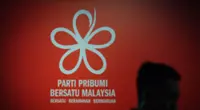KOTA KINABALU: A Sabah lawyer has called for the introduction of caning as a punishment for corruption as current penalties are ineffective in deterring offenders.
Parti Warisan legal advisor Chin Tek Ming launched an anti-corruption campaign along Gaya Street on Sunday (June 15), advocating for tougher laws including physical punishment for those found guilty of graft.





